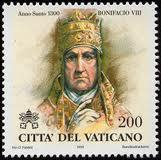
Forty-eight rubies, seventy-two sapphires, forty-five emeralds, sixty-six large pearls–according to reports, this was the papal crown that Pope Boniface the VIII wore on his head. It was the start of the 14th century and the (earthly) power of the church and the pope were at its height. In 1300, Boniface proclaimed a Holy Year, a Jubilee. The Pope offered a plenary indulgence–a full pardon for sins–for all who made the pilgrimage to the churches of St. Peter or St. Paul in Rome. The Jubilee was a huge commercial success.
But all was not well in the Empire. King Edward I of England and Philip IV of France were at odds with one another over a land dispute. To finance their war efforts, both kings considered taxing the clergy within their kingdoms. In the pope’s mind, however, only the church could tax the clergy. Philip persisted that he had the authority to tax Boniface’s church. The pope replied, in 1302, by issuing the papal bull Unam Sanctam. The word “bull” comes from the Latin word bulla which referred to the boiled seal that would be placed on official papal documents. Papal bull’s are always titled by the first words of the document. This one was called Unam Sanctam (“The One Holy”) as in “the only holy catholic church.” Unam Sanctam represented the farthest reaching power the Pope has ever claimed for the church.
Although Catholic historians and theologians debate the continuing significance of certain portions of the bull (especially the part about the church wielding the physical sword and temporal authority being subject to spiritual authority), there is no doubt that Unam Sanctam sowed the seeds for a Reformation revolt two centuries later. Anyone wanting to protect the final authority of the Bible and wary of entrusting absolute authority in any human office or human institution will want to protest the claim made in Unam Sanctam:
For this [spiritual] authority, although given to a man and exercised by a man, is not human, but rather divine, given at God’s mouth to Peter and established on a rock for him and his successors in Him whom he confessed. . . .Whoever therefore resists this power thus ordained of God, resists the ordinance of God. . . .Furthermore, we declare, state, and define and pronounce that it is altogether necessary to salvation for every human creature to be subject to the Roman pontiff.
Our baptismal liturgy in the RCA has the minister baptize “in the name of Jesus Christ, the only King and Head of his Church.” I love that line, not least of all because it rightly professes that there is only one head of Christ’s Church. There are many shepherds, but only one papa (the Latin word from which pope is derived). The church’s authority is built upon the foundation of the apostles and prophets, and her servants wield apostolic authority only in so far as they remain true to the apostolic deposit. God rules by his word and where that word is compromised or denied, obedience is not only not required, it must not be given.
While we can affirm many things about each other and enjoy warm relationships with those on the other side of the Protestant-Catholic divide, the deepest cleavage still remains. The Reformation happened, and continues to this day, because millions of Christians like me believe sola scriptura not Unam Sanctam.



